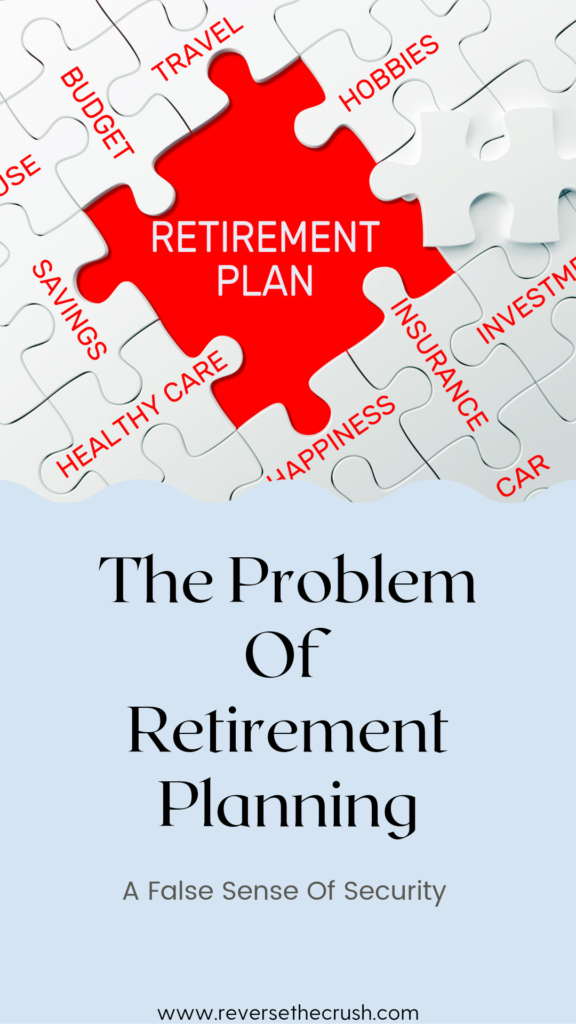Problem of retirement planning – Reaching retirement and having money can lead to a false sense of security. It doesn’t necessarily lead to happiness.
Author: Steve Cummings
Bio: Steve Cummings is the founder of the personal finance blog The Frugal Expat. As a traveler and expat, he has learned a lot about how to save money, live frugally, and invest for the future. His mission is to help people in saving, investing, and reaching financial independence!
It seems like everyone’s talking about retirement these days. I suppose it isn’t just “these days.” Retirement is a part of the lexicon in America. It’s the goal we’ve all been taught (or convinced) to pursue.
We’re told to calculate how much we need to save and invest in having a “secure” retirement.
The problem of retirement – whatever amount of money we decide we need for a secure retirement will likely give us a false sense of security.
That probably sounds a bit strange. Frankly, it was to me when I first thought about it. But the more I thought about it, the more it made sense. We often pursue goals that we think are our own without spending the time to see if that’s true.
Tim Maurer uses the phrase – personal finance is more personal than it is finance. So much time and energy are focused on the money aspect of retirement that we forget about the other essential things that go with it. What are those things?
As I read blog articles, news stories, or broadcasts on retirement, I hear much of the same things regurgitated. FIRE bloggers advise us to save 25X your annual expenses and live on the 4% rule. From the financial advice community, it’s often saving enough to provide a certain percentage of your current income. Others say calculate your expenses in retirement and have enough money in your savings and investments to provide the income to cover those. All of these strategies are reasonable and might work – financially.
Read on to learn about the problem of retirement planning.
The Problem Of Retirement Planning – A False Sense of Security

The Problem Of Retirement Planning – A False Sense of Security
A false sense of security
The main problem of retirement planning is it creates a false sense of security.
Getting right to the meat of the post: what, exactly, do I mean by a false sense of security? What I’m saying is that retirement is about much more than just money. It’s about lifestyle and family. It’s about how we spend our time; who we spend that time with and where we spend it.
Granted, all of those things cost money. We have to have enough money to sustain ourselves in retirement financially. And we have to calculate what that number is based on some math. Too many times, though, we put the cart before the horse. We focus on the money first and the lifestyle last.
Our lifestyle choices come out of our values. Our values define who we are. If we don’t calculate the income and savings we need based on the values and lifestyle we want, that’s what can lead to a false sense of security. A big pot of money is just that – a big pot of money. If we haven’t thought about what we want that money to do for us, we’re likely to spend more than we should. Conversely, we might spend less than we should.
Either way, we likely have a false sense of security that everything will work out. Financially, that might be true. Personally? Well, that might be another story.
False summits
Another blogger prompted me to think about this false sense of security. Dave, over at Accidental Fire, wrote a post about false summits. You see, Dave is an avid hiker, mountain climber, biker, and an all-around extreme sports kind of a guy. Dave opens his post with a story about climbing in search of the summit of the mountain they were tackling. He describes the difficulty of the climb in detail. Then it happens. They get to what they think is the summit only to find out it wasn’t. Looking beyond the horizon, they saw the actual summit was still on the horizon. They had work left to do.
That’s when it hit me. People who strive for goals need goals to sustain them. Mentally, they need continuous challenges to keep them satisfied. When we reach one goal, we need to go to the next higher goal. The metaphor of mountain climbing is a perfect example. If climbers reach a summit of 12,000 feet, they look for the 13,000 or 14,000 peaks for the next climb.
Another example is college and professional athletes. If a team wins a national championship, regardless of the sport, they don’t want to stop at one. Why stop at one? Two is even better. If two, then three. Driven, goal-oriented people need goals in front of them.
Look at the Boston Celtics and Los Angeles Lakers back in the Larry Bird/Magic Johnson era. The rivalry kept them going for years. Even after retirement from the NBA as players, both men kept their competitive juices flowing by taking on roles with other NBA teams. Larry Bird was general manager for the Indiana Pacers. Magic took positions with the Lakers. He also owns and manages various business interests.
Look across the college and professional sports landscape, and you’ll find numerous other examples. Thinking our push to achieve will somehow magically change in retirement leads to a false sense of security. We can have all the money we need and still be unhappy, feeling like something is missing.
Our False Summits on Traveling
While thinking of false summits, I am reminded of my wife and her ever-growing list of travel destinations. She has been to over 60 countries, and she strives to visit more.
We live the ex-pat life in Taiwan while using geo arbitrage to our advantage to save more money to travel more. It is interesting noticing that with each country visited, I too want to see more and more. We get this false summit that we will be satisfied with seeing the countries on our list, but then again, we add new ones to our list as we see the countries. This even shows with retirement planning as well.
The way we create our roadmaps to wealth or even follow steps to achieve wealth like Dave Ramsey’s baby steps pushes us to the end of our goals. Once we reach them and we have no other goals, we may feel a bit lost.
We may plan to be done with working in 9-10 years, but then what? After hitting that colossal goal, will we be satisfied? Will it be enough? Do we need more?
Managing the false summits
If we agree that goal-oriented people need continuous goals, then the question becomes, how do we deal with the false summits along the way? I would suggest there are three ways to deal with the problem of retirement planning.
- Understand false summits are part of the journey – May of us think the ultimate goal after our working careers is retirement. I would submit to you that’s the first false summit. For the reasons I suggested earlier, goal-oriented people need new goals. All of our big goals consist of smaller goals along the way. Thinking when we hit the stretch goal, it will be enough is a fool’s game. We will want more.
- Recognizing the false summits – We may think the big goal we’re pursuing is “the one” that will be enough. It might very well be. But what if it isn’t? What if we bet our money and time on this goal being the thing that gives us what we think we want? Believing that “things” will bring us happiness brings us to a false summit. Again, we have a better chance of avoiding this outcome if our goal lines up with our values. If we’re unhappy now, we will likely be unhappy when we reach our goals. We shouldn’t kid ourselves into thinking that reaching whatever summit we define for ourselves will somehow solve all our problems. It won’t.
- Thinking we have control of life is a false summit – We may be running full steam ahead toward our goal. We plan for every contingency we can think of along the way to ensure success. Then it happens. We find out we have cancer. We find out one of our kids is addicted to drugs or alcohol. Being flexible and understanding that we can’t plan for everything needs to be our mindset. How we respond to these life events makes all the difference in the world to the outcomes. We can’t control the events. We can control how we respond. I know it’s a tired cliche, but it’s true.

The Problem Of Retirement Planning – Final Thoughts
We all want to have security in life. The definition of security is different for each one of us. That’s why it’s important to define what security means to us. It needs to relate to our values; to what’s important in our lives. Intellectually, we know that “money can’t buy happiness.” It’s also true that it’s better to have money than not. Having money brings with it choices. That’s what financial independence is all about – choice.
My point is this – having all the money in the world won’t bring us happiness. It leads to a false summit, a false sense of security. We are built to be in relationship with one another. Even introverts have close relationships.
Howard Hughes was one of the wealthiest men in the world at the time of his death. He was also a miserable recluse. All of Hughe’s billions did not bring him happiness. His chasing and reaching of goals brought him to one false summit after another.
J.Paul Getty is another great example. Another of the wealthiest, most successful people in business on the planet. Getty chased more money at every turn in his life. He was a cold, cruel, tyrant in industry and with his family. The movie All the Money in the World is a haunting portrait of this man’s life. He’s another one who died a miserable, lonely death. He reached one false summit after another and never found happiness.
What about you? What false summits are you chasing? Are you pursuing something in the thought that it will make you happier? Example after example shows if you’re chasing happiness as a goal, you’re on the path toward a false sense of security.
Think about what you value. Think about the important relationships in your life. Pursue those things. Don’t be distracted by or attracted to the false summits you see along the way. Make sure you have enough rope, anchors, clips, and supplies for the ascent. Keep yourself grounded as you climb. Look ahead, not behind. The summit is just beyond the horizon.
Happy climbing!
Check Out These Other Articles On Retirement
What Is The Ideal Age For Early Retirement?
How To Live An Early Retired Lifestyle In 5 Years (Without Retiring)
Disadvantages Of Early Retirement Is A Bad Idea And What To Pursue Instead
Things To Do When Bored And Retired
I am not a licensed investment or tax adviser. All opinions are my own. This post may contain advertisements by Monumetric and Google Adsense. This post may also contains internal links, affiliate links to BizBudding, Amazon, Bluehost, and Questrade, links to trusted external sites, and links to RTC social media accounts.
Connect with RTC
Twitter: @Reversethecrush
Pinterest: @reversethecrushblog
Instagram: @reversethecrush_
Facebook: @reversethecrushblog
Email: graham@reversethecrush.com


 How To Reduce Bank Fees: 7 Foolproof Ways To Save Your Hard-Earned Money
How To Reduce Bank Fees: 7 Foolproof Ways To Save Your Hard-Earned Money
